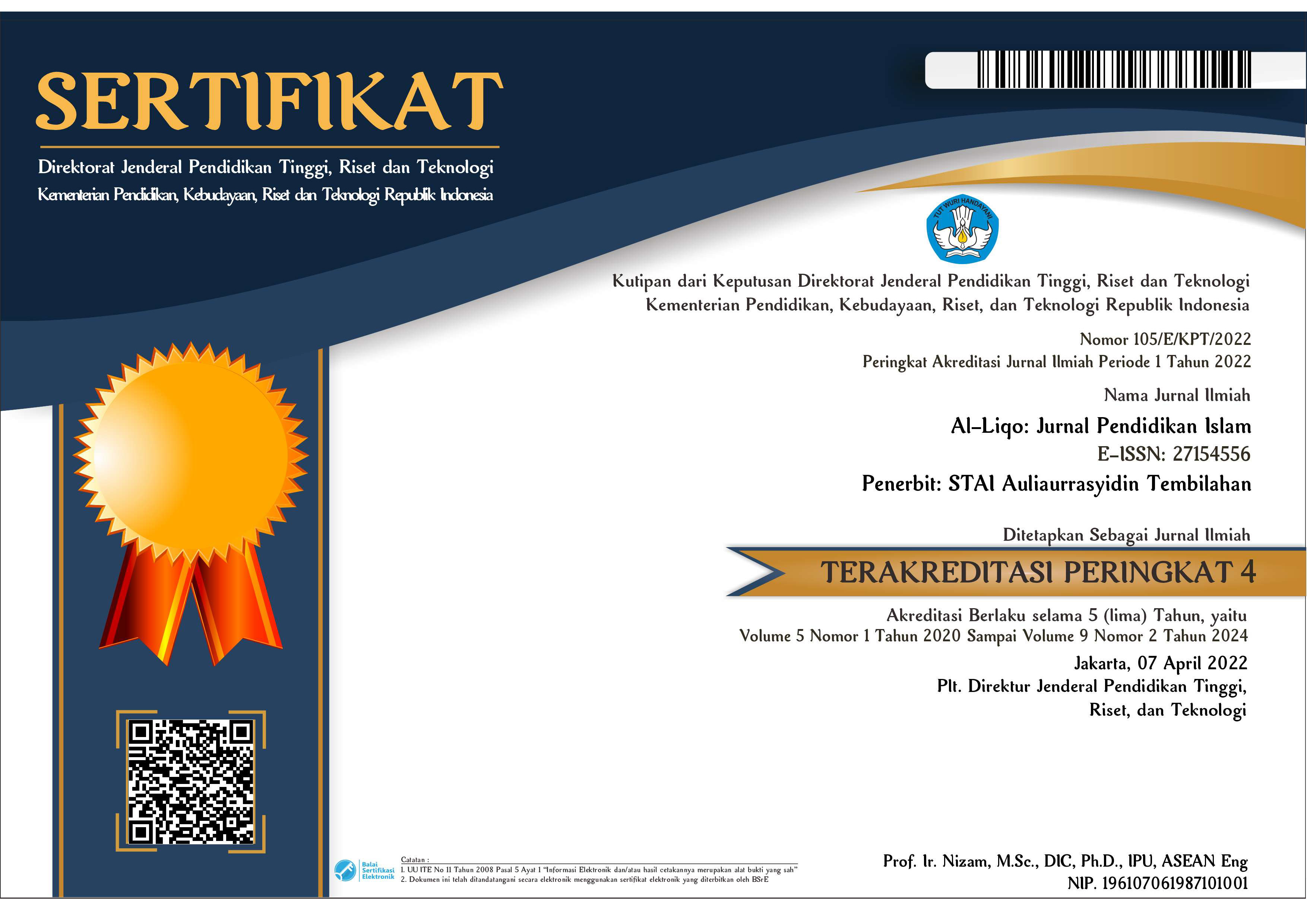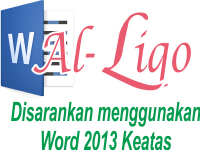Integration of Faith and Piety with IPTEK of Islamic Education According to Bj Habibie
DOI:
https://doi.org/10.46963/alliqo.v9i1.970Keywords:
Integration, Imtaq, Science and technology, Bachruddin Jusuf HabibieAbstract
This study aims to find out the concept of integration of imtaq and science and technology according to BJ. Habibie. The method used is the character study methodology with library research. The primary data source comes from books written by BJ Habibie as well as documentation in the form of his video shows. Meanwhile, secondary data sources come from books that are related to the research topic. The results of this study: His concepts and ideas regarding the need for integration between imtaq and science and technology in Islamic educational institutions to answer the backwardness of Muslims in the fields of science and technology, but still have a strong foundation of faith and piety. According to Habibie imtaq is a positive synergy of cultural elements and religious elements from the acculturation process in the family. While science and technology are the result of the educational process that is pursued by humans. The educational process that combines imtaq and science and technology will give birth to humans who are able to think analytically, systematically, deeply and long term. The result will be born science. Science will give birth to technology. These two dimensions must be synergized to form a superior human being.
Downloads
References
Abuddin Nata. (2020). Pendidikan Islam di Indonesia. Jakarta: Kencana.
Achmad Charis Zubair Bekker. (2011). Metodologi Penelitian Filsafat. Jakarta: Rajawali Press.
Ade Ma’ruf. (2014). B.J Habibie Guru Terbesar Saya Adalah Otak Saya. Yogyakarta: Ar-Ruzz Media.
Afif Habibi, B. H. (2015). -SDM yang unggul untuk kemajuan indonesia. Retrieved May 26, 2023, from https://www.youtube.com/watch? v=mEcb8U0Gyss&t=2765s
Amar Makruf. (2004). Dimensi Pemikiran Keisalaman BJ Habibie dalam Mengembangkan Sumber Daya Manusia (Studi Komparasi dengan Ismail Raji al-Faruqi dengan Pergerakan Islam Kultural Indonesia). Universitas Indonesia.
Atma, W. S. (2017). Kisah Perjuangan dan Inspirasi B.J. Habibie. Sleman: Checklist Media.
Azyumardi Azra. (2019). Pendidikan Islam, Tradisi dan Modernisasi Menuju Millenium Baru. Jakarta: Logos Wacana ILmu.
Bachruddin Jusuf Habibie. (2015). Ilmu Pengetahuan, Teknologi & Pembangunan Bangsa Menuju Dimensi Baru. Jakarta: CIDES (Centre for Information and Development Studies).
Beritasatu. (2019). Inspirasi Ramadan: Mencetak Manusia Unggul. Retrieved May 26, 2023, from https://www.youtube.com/watch?v=hT7-RJ5UdOo.
Habibie, B. J. (n.d.). Iptek Saja Tanpa Imtaq, Bahaya... Retrieved May 26, 2023, from Kompas.com website: https://nasional.kompas.com/read/2017/09/28/07090341/habibie-iptek-saja- tanpa-imtaq-bahaya?page=all#page2
Habibie, B. J. (2020). The Power of Ideas. Jakarta: Republika Penerbit.
Heru Setiawan. (2016). Integrasi Imtaq dan Iptek dalam Pengembangan Pendidikan Islam. Nidhomul Haq, 1.
Hikmah. (2019). Quizlet: A Digital Media for Learning Informatics Term. International Journal of English Education and Linguistics, 1.
Iis Uum Fardiana. (2015). Keselarasan Imtaq dan Iptek. Al-Adabiya, 10.
Jonar T.H Situmorang. (2017). B.J. Habibie Si Jenius: Sehimpun Cerita, Cita, dan Karya. Yogyakarta: iRCiSoD.
Lutfi Rachman. (2019). Konsensus Pendidikan Islam di Nusantara (Studi Integrasi IMTAQ dan IPTEK dalam Pendidikan Islam). Jurnal Pendidikan Islam, 8.
Makka, M. (2016). 60 Tahun BJ Habibie. Jakarta: Pustaka Cidesindo.
Makka, M. (2008). The True Life of Habibie: Cerita dibalik Kesuksesan. Surabaya: Pustaka Liman.
Makka, M. (2010). Jejak Pemikiran B.J. Habibie: Peradaban Teknologi untuk Kemandirian Bangsa. Bandung: Mizan Pustaka.
Makka, M. (2011). Habibie: Kecil Tapi Otak Semua. Depok: Edelweiss.
Makka, M. (2016). Habibie: Totalitas Sang Teknosof. Solo: Metagraf.
Nana Syaodih Sukmadinata. (2005). Metode Penelitian Pendidikan. Bandung: Remaja Rosada Karya.
Nugroho Purnomo. (2017). BJ Habibie Memberikan Pesan Penting Untuk Para Pelajar. Retrieved May 26, 2023, from https://www.youtube.com/watch?v=3Oumnx4o18A.
Susanto Sastraredja. (2018). Jangan Pernah Berhenti (jadi) Habibie. Solo: Tiga Serangkai.
Syharin Harahap. (2011). Metodologi Studi Tokoh dan Penulisan Biografi. Bandung: Kencana.
Downloads
Published
Issue
Section
License
Copyright (c) 2024 Imroatul Muthoharoh, Alif Anharul Fahmi, Muhammad Fadli Ramadhan

This work is licensed under a Creative Commons Attribution-ShareAlike 4.0 International License.
Authors who publish with this journal agree to the following terms:
1. Copyright on any article is retained by the author(s).
2. The author grants the journal, right of first publication with the work simultaneously licensed under a Creative Commons Attribution shareAlike 4.0 International License that allows others to share the work with an acknowledgment of the work’s authorship and initial publication in this journal.
3. Authors are able to enter into separate, additional contractual arrangements for the non-exclusive distribution of the journal’s published version of the work (e.g., post it to an institutional repository or publish it in a book), with an acknowledgment of its initial publication in this journal.
4. Authors are permitted and encouraged to post their work online (e.g., in institutional repositories or on their website) prior to and during the submission process, as it can lead to productive exchanges, as well as earlier and greater citation of published work.
5. The article and any associated published material is distributed under the Creative Commons Attribution-ShareAlike 4.0 International License







2.png)



